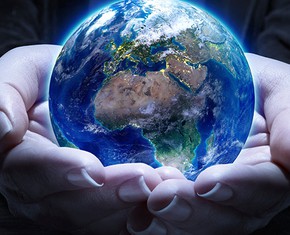The views expressed in our content reflect individual perspectives and do not represent the authoritative views of the Baha'i Faith.
Environmental protection, Pope Francis points out in his Laudato Si’ encyclical, cannot be assured solely on the basis of financial cost-benefit calculations. The health of the Earth, in other words, trumps every financial consideration.
With respect to genetically-modified organisms (GMOs) the Pope notes that “a technology severed from ethics will not easily be able, by itself, to limit its own power.” (§136). He refers to the need for common and differentiated responsibilities, speaks out against carbon credits, and calls for help with less polluting forms of energy. He cites the need for enforceable international agreements, global regulatory norms, environmental impact assessment, and the precautionary principle. On ocean governance, he says, we need an agreement on systems of governance for the whole range of so-called “global commons” (§174).
We have witnessed a weakening of the power of nation states, chiefly because the economic, corporate and financial sectors, being transnational, tend to prevail over the political. Given this situation, it is essential to devise stronger and more efficiently organized international institutions, with functionaries who are appointed fairly by agreement among national governments, and empowered to impose sanctions:
The myopia of power politics delays the inclusion of a far-sighted environmental agenda within the overall agenda of governments…. True statecraft is manifest when, in difficult times, we uphold high principles and think of the long-term common good. Political powers do not find it easy to assume this duty in the work of nation-building. (§178)
What is needed is a politics which is farsighted and capable of a new, integral and interdisciplinary approach to handling the different aspects of the crisis. Often, politics itself is responsible for the disrepute in which it is held, on account of corruption and the failure to enact sound public policies. (§197)
The Pope’s letter calls for an economic system that becomes a worthy expression of our most noble human qualities, striving intelligently, boldly and responsibly to promote a sustainable and equitable development within the context of a broader concept of quality of life. As in the Baha’i writings, it emphasizes the importance and nobility of work:
We were created with a vocation to work. The goal should not be that technological progress increasingly replace human work, for this would be detrimental to humanity. Work is a necessity, part of the meaning of life on this earth, a path to growth, human development and personal fulfilment. (§128)
Business is a noble vocation, directed to producing wealth and improving our world. It can be a fruitful source of prosperity for the areas in which it operates, especially if it sees the creation of jobs as an essential part of its service to the common good. (§129)
…each child must be taught a profession, art, or trade, so that every member of the community will be enabled to earn his own livelihood. Work done in the spirit of service is the highest form of worship. – Abdu’l-Baha, Divine Philosophy, p. 83.
Unbridled economic growth, the Papal encyclical says, should never become a goal in and of itself—instead, sustainable development can set limits to growth by investing in the natural world and its stewardship:
With respect to growth, a decrease in the pace of production and consumption can at times give rise to another form of progress and development. Efforts to promote a sustainable use of natural resources are not a waste of money, but rather an investment capable of providing other economic benefits in the medium term. If we look at the larger picture, we can see that more diversified and innovative forms of production which impact less on the environment can prove very profitable. (§191)
If in some cases sustainable development were to involve new forms of growth, in other cases, given the insatiable and irresponsible growth produced over many decades, we need also to think of containing growth by setting some reasonable limits and even retracing our steps before it is too late. (§193)
This delicate balance between the material and the spiritual, so ignored by the economic systems human beings have so far been able to set up and propagate, has become an urgent requirement of the present age:
…material progress and spiritual progress are two very different things, and that only if material progress goes hand in hand with spirituality can any real progress come about… – Abdu’l-Baha, Paris Talks, p. 108.
















Comments
Sign in or create an account
Continue with Googleor